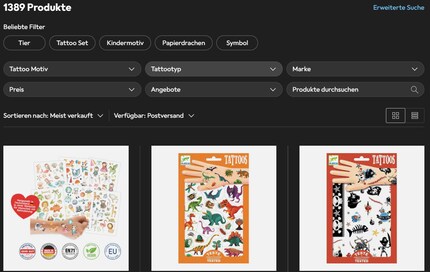
Background information
Shop on Temu if you want, but doing so has its consequences
by Martin Jungfer

There's no escaping colourful decals on your skin as a child. At some point, unicorns, pirates or colourful butterflies adorn the arm. But hardly any of the products tested by Öko-Test are free from harmful substances.
Both the guidelines for toys and those for cosmetic products were used as a benchmark. The packaging materials used were also included in the assessment. An "unsatisfactory" does not therefore mean that the products may not be sold in this form.
Only two products are "very good" according to the Öko-Test standards: Namaki Cosmetics' space decal tattoos and Lutz Mauder's construction site vehicle tattoos. Both are currently not available in the Galaxus range.
However, there is already a new construction site at Lutz Mauder: the tested product comes from leftover stock. The manufacturer is switching production - according to Öko-Test to the composition of many test losers. Which brings us to the topic. The ingredients found that make everyone else a loser. The most important ones:
The list of substances that not only Öko-Test wants to keep away from children's skin is long. Benzene was found in a test product purchased on Shein in a quantity that is also prohibited for toys according to European guidelines. It was withdrawn from sale. Naphthalene was detected in children's tattoos purchased from Shein, Temu and Amazon. Öko-Test describes it as "striking" that all three products were purchased from large online platforms.
When it comes to talcum powder, Öko-Test speaks of "preventive consumer protection". The mineral used as a filler or release agent was classified as a probable carcinogen by the International Agency for Research on Cancer last year. It could be banned by European authorities in cosmetics by the end of 2025.
Simple writer and dad of two who likes to be on the move, wading through everyday family life. Juggling several balls, I'll occasionally drop one. It could be a ball, or a remark. Or both.
From the latest iPhone to the return of 80s fashion. The editorial team will help you make sense of it all.
Show all13 out of 15 are unsatisfactory. This report was issued by Öko-Test to the manufacturers of children's tattoos, who are launching their products onto the market in batches. They then spread to the little ones faster than the current wave of colds. If they have one, they will soon have them all. What at first glance appears to be harmless fun on children's arms looks different in laboratory tests. In many cases, harmful ingredients have been detected. Specifically, these are carcinogenic substances or substances that are at least suspected of being carcinogenic.
The 15 products were purchased partly from local retailers and partly online and tested according to strict laboratory standards and other verifiable criteria. Suppliers who did not provide information about the ingredients on the packaging or the product as required, for example, were asked to name them and devalued accordingly. The lack of a CE mark, which is mandatory for toys on sale in the EU, was also criticised. In Switzerland, the CE mark for toys has no legal significance.
It is not appropriate to just point the finger at others. At Galaxus, the children's tattoos from Djeco are among the bestsellers. And at least the dream butterflies, which were criticised by Öko-Test, have provided reasons to possibly flutter out of the range. The case is currently being reviewed internally and you will read "currently out of stock" if you follow this link or the products linked below that were specifically criticised in the test.
In addition to the toxic trace element antimony, vinyl acetate was also found in Djeco. This would be banned in cosmetic products. Are children's tattoos? The manufacturer says no and refers to the somewhat cryptic REACH regulation of the EU and the definition of "articles" contained therein. Öko-Test, on the other hand, states unequivocally: "We believe that such problematic substances have no place on children's skin."

Nine products were devalued due to talc, among other things. Listed at Galaxus were the TOPModel Tattoo Block and the Tattoobook Unicorns. A tattoo set of the brand Paper Dragons was also among them.
As almost all of the products tested were classified as "unsatisfactory", it can be assumed that this sample could be expanded at will. Claims such as "dermatologically tested" and other test seals are more likely to be categorised as marketing. The ingredients should be listed on the packaging, which is not always the case and only provides limited certainty anyway. The only certainty is that adhesive tattoos should be worn sparingly rather than excessively.